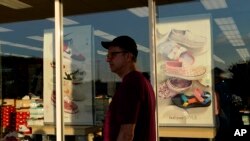President Joe Biden told The Associated Press on Thursday that the American people are "really, really down" after a tumultuous two years with the coronavirus pandemic, volatility in the economy and now surging gasoline prices that are slamming family budgets.
He said a recession is not inevitable and bristled at claims by Republican lawmakers that last year's COVID-19 aid plan was fully to blame for inflation reaching a 40-year high, calling that argument bizarre.
As for the overall American mindset, Biden said, "People are really, really down."
"They're really down," he said. "The need for mental health in America, it has skyrocketed, because people have seen everything upset. Everything they've counted on upset. But most of it's the consequence of what's happened, what happened as a consequence of the COVID crisis."
Speaking to the AP in a 30-minute Oval Office interview, Biden addressed the warnings by economists that the United States could be headed for a recession.
"First of all, it's not inevitable," he said. "Secondly, we're in a stronger position than any nation in the world to overcome this inflation."
As for the causes of inflation, Biden flashed some defensiveness on that count.
"If it's my fault, why is it the case in every other major industrial country in the world that inflation is higher? You ask yourself that? I'm not being a wise guy," he said.
The president said he saw reason for optimism with the 3.6% unemployment rate and America's relative strength in the world.
"Be confident, because I am confident we're better positioned than any country in the world to own the second quarter of the 21st century," Biden said. "That's not hyperbole, that's a fact."
Biden's bleak assessment of the national psyche comes as voters have soured on his job performance and the direction of the country. Only 39% of U.S. adults approve of Biden's performance as president, according to a May poll from The Associated Press-NORC Center for Public Research, dipping from negative ratings a month earlier.
The president outlined some of the hard choices he has faced, saying the U.S. needed to stand up to Russian President Vladimir Putin for invading Ukraine in February even though tough sanctions imposed as a result of that war have helped caused gas prices to surge, creating a political risk for Biden in an election year. He called on oil companies to think of the world's short-term needs and increase production.
Asked why he ordered the financial penalties against Moscow that have helped disrupt food and energy markets globally, Biden said he made his calculation as commander in chief rather than as a politician thinking about the election.
"I'm the president of the United States," he said. "It's what's best in the country. No kidding. No kidding. So what happens? What happens if the strongest power in NATO, the organizational structure we put together, walked away from Russian aggression?"
Biden talked about the possibility of chaos in Europe if an unimpeded Russia kept moving deeper into the continent, China was emboldened to take over Taiwan and North Korea grew even more aggressive with its nuclear weapon ambitions.
Biden renewed his contention that major oil companies have benefited from higher prices without increasing production as much as they should. He said the companies needed to think of the world in the short term, not just their investors.
Recession Is 'Not Inevitable,' Biden Says in AP Interview

WASHINGTON —



